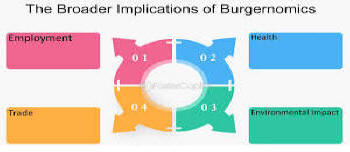Economic Implications
The fast-food industry significantly influences economies worldwide,
providing employment and generating substantial revenue, but also
creating disparities and influencing public health policies.

Fast-food restaurants are among of the biggest employers in the
world, particularly for jobs at the entry level. It's well known
that fast-food industry provides a lot of jobs. They are
particularly crucial for those seeking their first job or for those
who might not have many other employment options. These positions
might be in cleaning, cash register, or cooking. These positions are
crucial for employment, but they typically pay poorly and don't
provide benefits like retirement plans or health insurance.
Grossman, M. (2017). This implies that individuals may still find it
difficult to earn enough money to meet their basic necessities even
when they have work.
These low-paying occupations with few benefits add to the phenomenon
known as "economic disparities," or variations in income and
stability in the economy between various social groupings. Compared
to individuals in higher-paying positions with greater benefits,
workers in the fast-food business frequently make less money and
have less financial stability. In order to optimise their
profitability, fast-food chains frequently concentrate on minimising
their expenses. This may entail making savings on compensation,
benefits, and even the working environment in the eateries.
Fast-food businesses can have subpar working conditions since
cutting costs is the main priority. This might involve things like
excessively hectic work schedules, insufficient breaks, or
inadequate safety precautions. Overall, while fast-food chains play
a significant role in providing jobs, the nature of these jobs can
contribute to broader social and economic issues, affecting the
quality of life for the workers.
Impact on Healthcare Costs
The health problems linked to frequent fast-food eating are a contributing factor to the increase in public healthcare expenses. Frequent fast-food customers are more likely to suffer from obesity, diabetes, and cardiovascular illnesses, which raise healthcare costs and have an impact on local and national economies. Naroff & Scherer (2014).
Market Dynamics
The influence of the fast-food industry on global markets is very strong. It shapes what farmers grow and how food is produced, changes rules about food, and affects how food products move around the world. However, not all of its impacts are positive. Fast food is often criticized for encouraging poor eating habits, creating health problems, and making it harder for small businesses and local economies to thrive. (Aggarwal et al., 2012, p. 8)